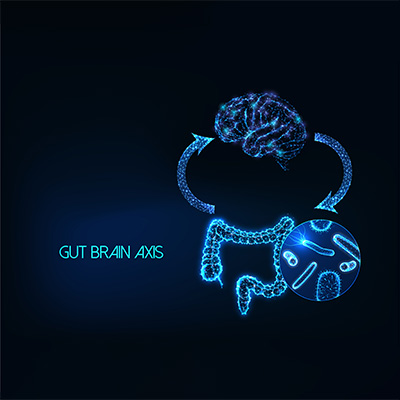
SIBO (Small Intestinal Bacterial Overgrowth) is a condition in which an excessive amount of bacteria grows in the small intestine, leading to a wide range of symptoms such as bloating, gas, abdominal pain, and diarrhea. SIBO can result from various factors such as a weakened immune system, head injuries or concussions, chronic stress, use of antibiotics, and other medications, as well as a diet high in refined carbohydrates and low in fiber. Any of these factors can disrupt the communication between the brain and gut, leading to digestive problems and bacterial overgrowth.
Treating SIBO requires addressing multiple factors, including the digestive system, migrating motor complex, and brain-gut axis. In this blog, we will explore each of these areas and why they are essential for the effective treatment of SIBO.
The digestive system is responsible for breaking down food and absorbing nutrients from it. In SIBO, the bacteria in the small intestine can interfere with the digestive process, leading to the malabsorption of nutrients and other digestive problems. It is essential to optimize digestion to reduce the bacterial load in the small intestine.
One way to optimize digestion is by eating a nutrient-dense, whole-food-based diet that is low in processed and inflammatory foods. Many people promote low FODMAP diets. However, we find that we need to take a more specific approach and remove inflammatory foods for the client but not make the diet too restrictive.
Another way to optimize digestion is by supporting digestive enzymes and stomach acid production. Digestive enzymes help to break down food and improve nutrient absorption, while stomach acid helps to kill off harmful bacteria in the stomach before they enter the small intestine. Digestive enzyme supplements and betaine HCl supplements can support digestive function.
The migrating motor complex (MMC) is a series of contractions that occur in the small intestine during periods of fasting, sweeping out any leftover food and bacteria. In SIBO, the MMC may be compromised, leading to bacterial overgrowth.
Fasting for at least 12 hours overnight can help to support the MMC, as it allows it to complete its cleaning cycle without interruption. Eating smaller, more frequent meals throughout the day can also help to reduce the bacterial load in the small intestine by keeping the digestive system active and reducing the time bacteria spend in the small intestine.
The brain-gut axis is the communication system between the brain and the gut. It is responsible for regulating various aspects of digestive function, including the release of digestive enzymes, stomach acid, and the MMC.
Chronic stress can disrupt the brain-gut axis, leading to digestive problems and bacterial overgrowth. Stress-reducing practices such as meditation, deep breathing, and yoga can help to reduce stress and improve gut function. Also, treatments to help to support the Vagus Nerve can also be beneficial.
Additionally, certain supplements, such as probiotics and prebiotics, can help to support a healthy balance of gut bacteria, which can help to reduce the overgrowth of harmful bacteria in the small intestine. And certain supplements, like oregano and berberine, can be used to help to decrease the overgrowth in the small intestine.
At One Agora Health, we take an integrative approach to SIBO treatment. We recognize that each person with SIBO has unique needs and requires an individualized approach to treatment. Our approach combines conventional and alternative therapies to address the root cause of SIBO and improve overall health.
We start by conducting a thorough evaluation of the digestive system and other relevant factors such as stress, sleep, and lifestyle habits. We may recommend diagnostic tests such as breath tests and stool analyses to identify the type and severity of SIBO.
Treatment typically includes dietary changes, supplements or medications such as digestive enzymes, probiotics, and antimicrobial herbs. We also recommend neurological support to reconnect the brain-gut axis and restore proper function of the Vagus Nerve. We may also recommend lifestyle changes such as stress-reducing practices and exercise to support gut health. Our treatment plan also includes low dose immunotherapy to reset the immune system and decrease food sensitivities.
By taking an integrative approach to SIBO, we aim to not only alleviate symptoms but also improve overall health and prevent future occurrences of SIBO.
In conclusion, SIBO is a complex condition that requires a comprehensive approach to treatment. By addressing the digestive system, migrating motor complex, and brain-gut axis, it is possible to reduce the bacterial load in the small intestine and improve digestive function. Working with a qualified healthcare practitioner can help to develop an individualized treatment plan that addresses the specific needs of each person with SIBO.
Click Here to find the SIBO products that I recommend with a 20% discount.